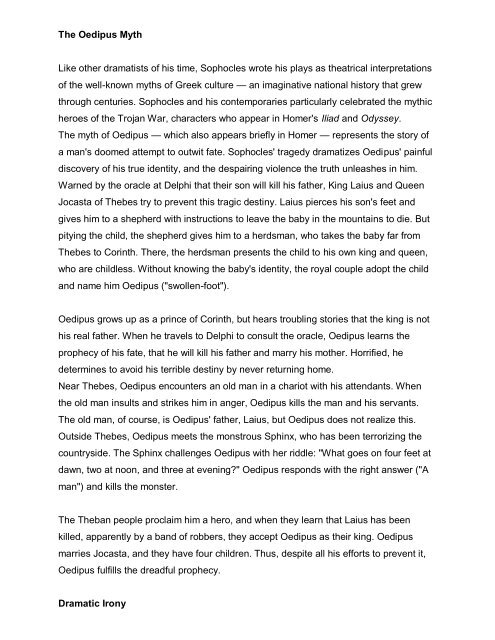Oedipus Trilogy Resources : Primarily Rex and Colonus
Oedipus Trilogy Resources : Primarily Rex and Colonus
Oedipus Trilogy Resources : Primarily Rex and Colonus
You also want an ePaper? Increase the reach of your titles
YUMPU automatically turns print PDFs into web optimized ePapers that Google loves.
The <strong>Oedipus</strong> Myth<br />
Like other dramatists of his time, Sophocles wrote his plays as theatrical interpretations<br />
of the well-known myths of Greek culture — an imaginative national history that grew<br />
through centuries. Sophocles <strong>and</strong> his contemporaries particularly celebrated the mythic<br />
heroes of the Trojan War, characters who appear in Homer's Iliad <strong>and</strong> Odyssey.<br />
The myth of <strong>Oedipus</strong> — which also appears briefly in Homer — represents the story of<br />
a man's doomed attempt to outwit fate. Sophocles' tragedy dramatizes <strong>Oedipus</strong>' painful<br />
discovery of his true identity, <strong>and</strong> the despairing violence the truth unleashes in him.<br />
Warned by the oracle at Delphi that their son will kill his father, King Laius <strong>and</strong> Queen<br />
Jocasta of Thebes try to prevent this tragic destiny. Laius pierces his son's feet <strong>and</strong><br />
gives him to a shepherd with instructions to leave the baby in the mountains to die. But<br />
pitying the child, the shepherd gives him to a herdsman, who takes the baby far from<br />
Thebes to Corinth. There, the herdsman presents the child to his own king <strong>and</strong> queen,<br />
who are childless. Without knowing the baby's identity, the royal couple adopt the child<br />
<strong>and</strong> name him <strong>Oedipus</strong> ("swollen-foot").<br />
<strong>Oedipus</strong> grows up as a prince of Corinth, but hears troubling stories that the king is not<br />
his real father. When he travels to Delphi to consult the oracle, <strong>Oedipus</strong> learns the<br />
prophecy of his fate, that he will kill his father <strong>and</strong> marry his mother. Horrified, he<br />
determines to avoid his terrible destiny by never returning home.<br />
Near Thebes, <strong>Oedipus</strong> encounters an old man in a chariot with his attendants. When<br />
the old man insults <strong>and</strong> strikes him in anger, <strong>Oedipus</strong> kills the man <strong>and</strong> his servants.<br />
The old man, of course, is <strong>Oedipus</strong>' father, Laius, but <strong>Oedipus</strong> does not realize this.<br />
Outside Thebes, <strong>Oedipus</strong> meets the monstrous Sphinx, who has been terrorizing the<br />
countryside. The Sphinx challenges <strong>Oedipus</strong> with her riddle: "What goes on four feet at<br />
dawn, two at noon, <strong>and</strong> three at evening?" <strong>Oedipus</strong> responds with the right answer ("A<br />
man") <strong>and</strong> kills the monster.<br />
The Theban people proclaim him a hero, <strong>and</strong> when they learn that Laius has been<br />
killed, apparently by a b<strong>and</strong> of robbers, they accept <strong>Oedipus</strong> as their king. <strong>Oedipus</strong><br />
marries Jocasta, <strong>and</strong> they have four children. Thus, despite all his efforts to prevent it,<br />
<strong>Oedipus</strong> fulfills the dreadful prophecy.<br />
Dramatic Irony


